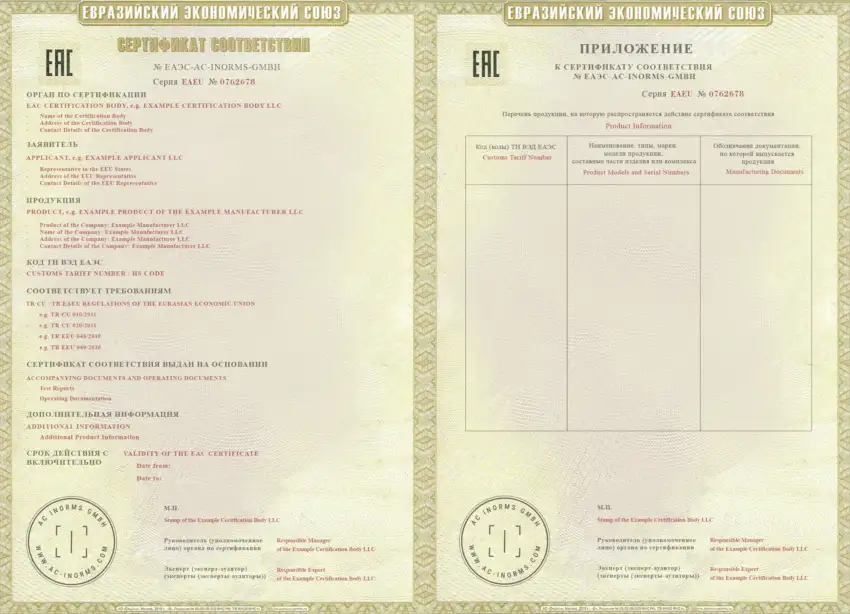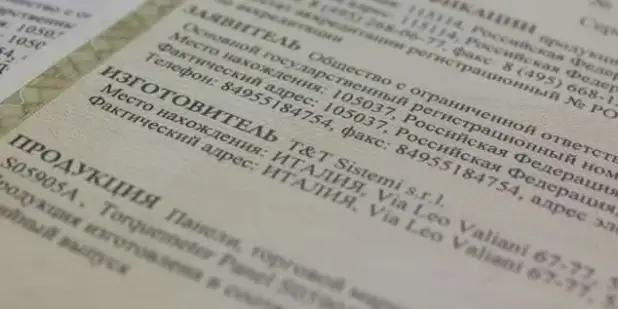An EAC certificate is an official document of conformity that is required for the import and sale of products in the Eurasian Economic Union. The EAC certification confirms that the products in question comply with the Technical Regulations (TR CU/EAEU) of the EAEU states. These requirements are defined in the Technical Regulations of the EAEU. Proof that a product complies with the TR CU/EAEU regulations is provided by the EAC conformity assessment.
When exporting to EAEU countries, manufacturers must carry out EAC certification. All product groups such as machinery, production equipment, electrical appliances or foodstuffs must be certified before being imported into the Eurasian Economic Union.
What is an EAC Certificate?
It is a proof of conformity that a product meets the EAC safety standards and GOST quality requirements of the member states of the Eurasian Economic Union.
EAC stands for Eurasian Conformity and is a uniform product marking (EAC marking) for export to the EAEU member states.
The EAC certificates are equally valid in the entire EAEU area. The EAC approval confirms that a product complies with the safety requirements and quality standards of the technical regulations of the EAEU member states. This gives the manufacturer the official authorization to import the product into the EAEU and to market and sell it there.
When do you need an EAC Certificate?
An EAC certificate is an essential document for companies wishing to export products to the EAEU. It ensures conformity with the technical regulations of the EAEU states and enables customs clearance and trade.
The EAC certificate is valid in all EAEU states (Russia, Kazakhstan, Belarus, Armenia and Kyrgyzstan). In addition to EAC certification, GOST certification exists in the individual EAEU states.
When does the manufacturer have to provide the EAC certificate:
- When importing into the EAEU member states
- Before use or sale in the EAEU destination country
Tasks and objectives of EAC certification:
- Customs clearance: The certificate is required for proper customs clearance
- Product safety: Certification ensures the safety of goods
- Quality guarantee: Certification confirms that products are of sufficient quality
How long is an EAC Certificate valid for?
The validity period of a certificate can be up to 5 years, depending on the product group and the applicable technical regulations of the EAEU countries. Basically the following applies:
Series production: A certificate for series production is generally valid for 1 to 5 years, depending on the certification scheme selected and whether regular inspection control is provided.
Individual delivery: For individual deliveries or projects, the certificate is only issued for the specific delivery. It is valid once and the approval ends with the import of the certified goods.
How does the EAC Certification process work?
The EAC certification is issued by the accredited certification bodies and entered in the certification register after all mandatory product tests and quality assessments have been successfully completed.
The accredited certification body carries out comprehensive product testing and quality assessments to ensure that the products comply with the TR CU/EAEU regulations.
Whether a product requires an EAC certificate is defined in the regulations of the Eurasian Economic Union. There are currently 52 sets of regulations in force in the EAEU states, which cover a large number of product groups and define binding requirements for their EAC conformity.
The EAC assessment is based on the following two pieces of information:
- Customs tariff number (HS Code)
- Technical product description
On this basis, you can look up the regulations:
- Whether the product is subject to mandatory certification
- Which form of conformity assessment is to be used
- Which assessment scheme is relevant for the product
In addition, the regulations contain precise information on which documents and evidence are required to initiate the conformity assessment procedure.

For which products is Certification required?
An EAC certificate is required for several product groups, including machinery, production equipment, pressure equipment, ATEX equipment and many other products.
Products for which certification is required:
Product Group | Application Area |
|---|---|
Machines | Production Machines |
Pressure Equipment | Pressure vessels or heat Exchangers |
ATEX Equipment | Potentially Explosive Atmosphere |
Electrical Appliances | Household Appliances or Industrial Electronics |
Fashion | Textiles, Clothing or Shoes |
Rail Vehicles | Locomotives, Wagons, Signaling Technology |
Vehicles | Braking Systems or Lighting Equipment |
Measuring Instruments | Scales, Sensors or Test Benches |
This table is not exhaustive, the certification obligation depends on the respective technical regulations (TR CU/EAEU) that apply to the respective product.
With AC Inorms GmbH, manufacturers are on the safe side! Thanks to our close cooperation with several accredited certification bodies within the Eurasian Economic Union, we offer German and European manufacturers optimum conditions for EAC certification.


